How to Make Composted Rabbit Tea
Don’t let that precious bunny poo go to waste! There are so many benefits to using composted rabbit tea in your garden! Let me show you how easy it is to make and use and why it’s totally worth making a batch!
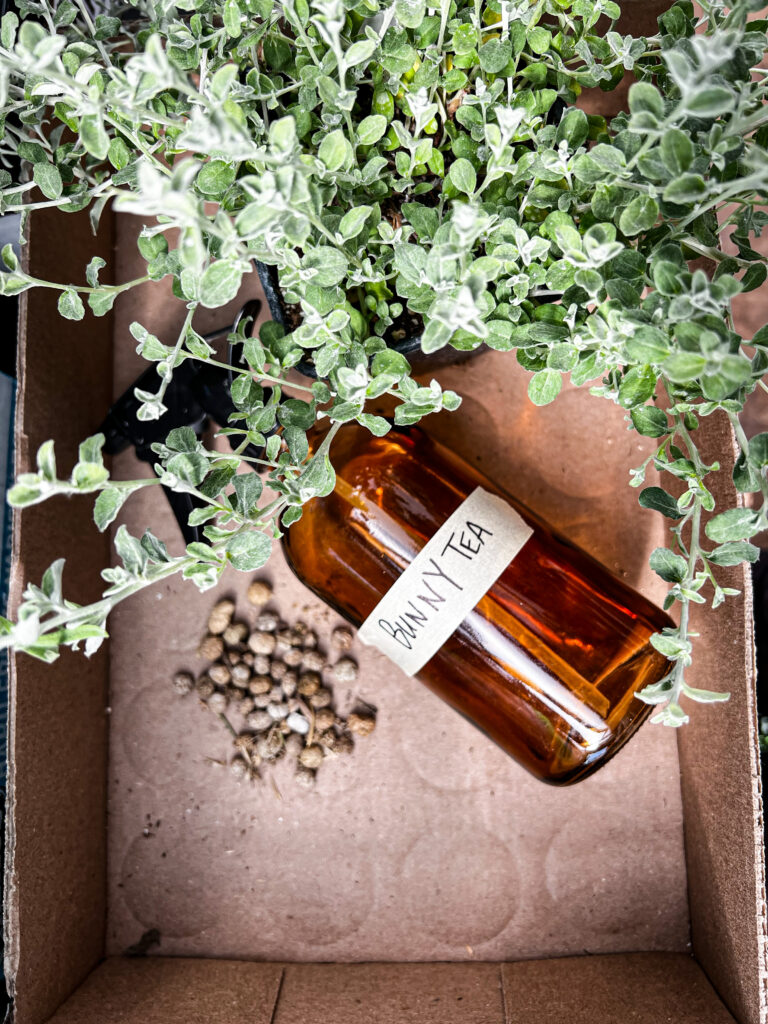
Composted Rabbit Manure Tea | ‘Bunny Tea’
This natural ultra-premium liquid fertilizer can cost anywhere between $5-$15/ pound, so if you already have a rabbit or two, why not give it a try? This is an easy-to-make natural fertilizer that you can make to optimize your plant health and growth. Think of this as the equivalent of drinking an electrolyte water vs regular water. This bunny brew is organic gardening at it’s finest and will maintain and sustain the natural elements your plants need.
Why Use Rabbit Manure in your Garden
There are all sorts of reasons why keeping a rabbit on your farm is a good idea, you can read all about that in this post!
Rabbit pellets/ manure is higher in nutrients than chicken, cow, horse manure. It is considered a ‘cold’ manure which means it can be added directly to the plants without a resting period.
Rabbit manure contains approximately Nitrogen: Phosphorus : Potassium otherwise known as
N:P:K/ 2.1 – 1.4 – .06
Although bunny poop has way higher nitrogen content that chicken, goat, sheep, horse or cow manure, the nitrogen is release slowly.
If you simply scatter the bunny pellets into your soil, the manure will slowly release the nitrogen. This slow release will help improve your soil structure and drainage and even help retain its moisture.
Rabbit poop doesn’t have to be composted at all, saving you time, equipment and space in order to be used. You could totally chose to compost the manure, but it’s beneficial even if you don’t.
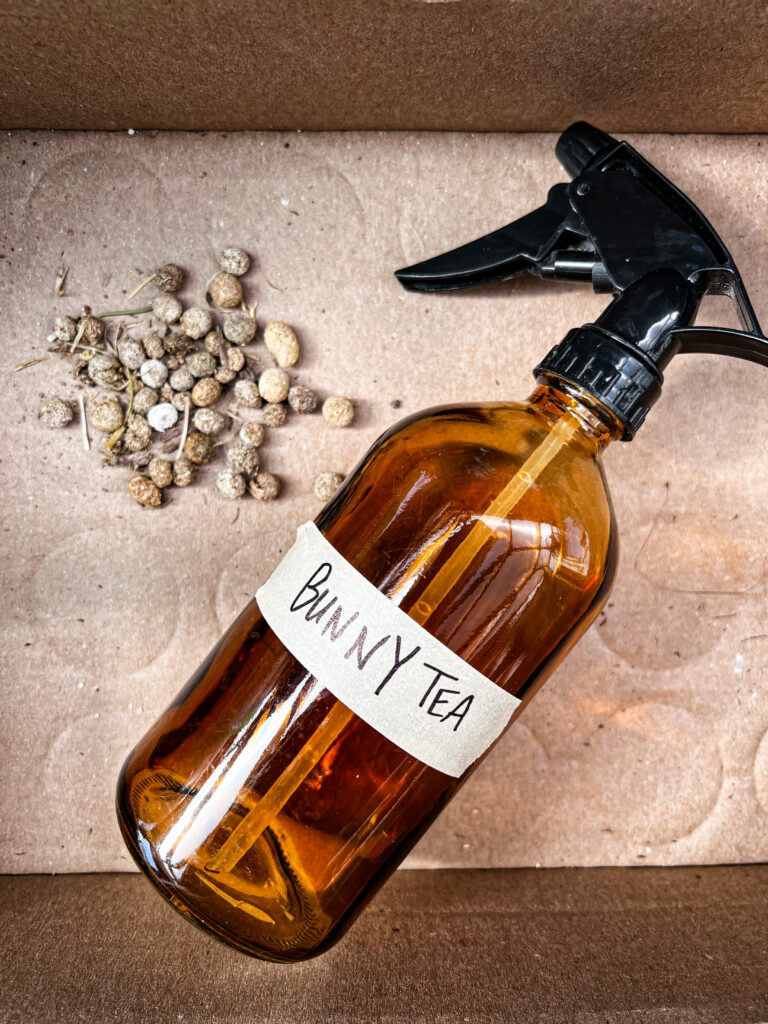
Nitrogen, Phosphorus and Potassium in your Garden
All naturally found in your gardens soil already. Rabbit manure can work wonders to feed your plants and flowers. But what are these things and how are they helping my actual plants?
Nitrogen
Nitrogen is the responsible agent in your soil that give the plants their green color. It also provides food for the plant, giving it that energy it needs to grow.
Phosphorus
Phosphorous aids plants in root growth and enhances their power to produce flowers. It transforms solar energy into chemical energy and helps the plant endure stress.
Potassium
Simply put, without potassium a plant will not grow. It is essential for the movement of water, nutrients, and carbohydrates throughout the plant. It also helps produce quality fruit and flower and prevents diseases.
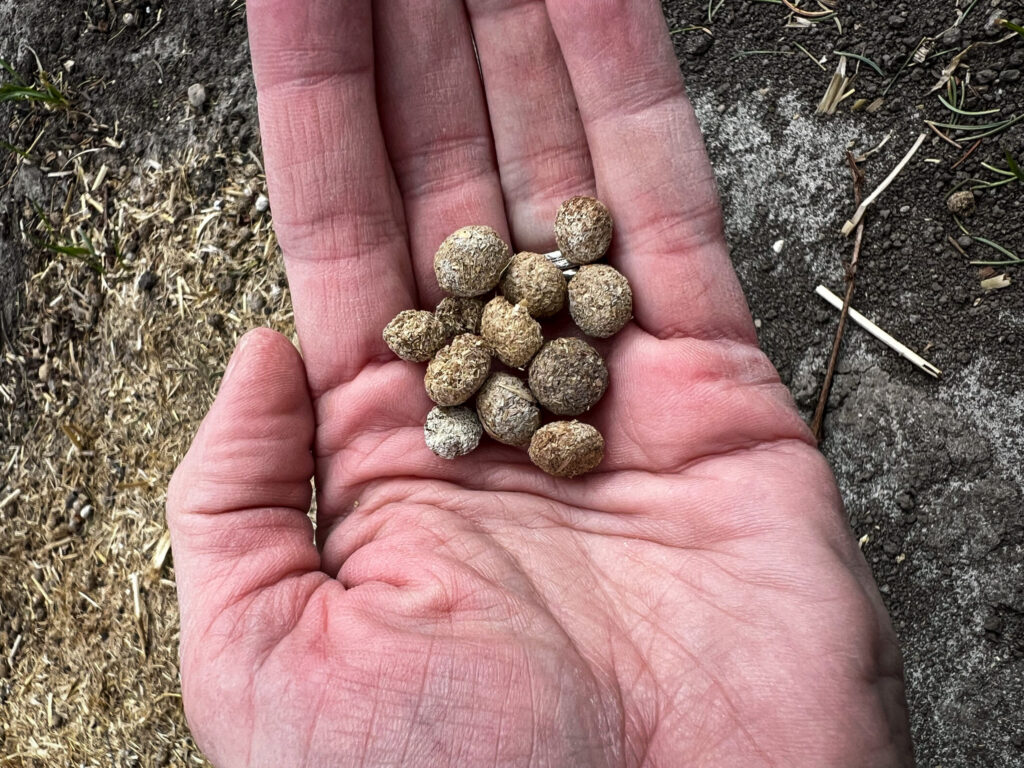
The Benefits to Using Rabbit Manure in your Garden
- Rabbit manure will boost the life cycle of the microorganisms in the soil!
- Bunny pellets are the most concentrated herbivore manure there is!
- Rabbits don’t poop in large quantities, so their poop is a valuable commodity around here. Don’t waste that bunny dung!
- Bunny poop doesn’t smell so don’t worry about any strong odor in this process. Name one other animal’s waste that can hold up to this benefit!
- Into vermaculture or worm composting? Your red wigglers and other worms will love a dose of rabbit manure added into their compost!
- These tiny pellets are packed with calcium, zinc, magnesium, sulfur, boron, cobalt, copper and the list goes on!
- Bunny poop contains much fewer pathogen problems
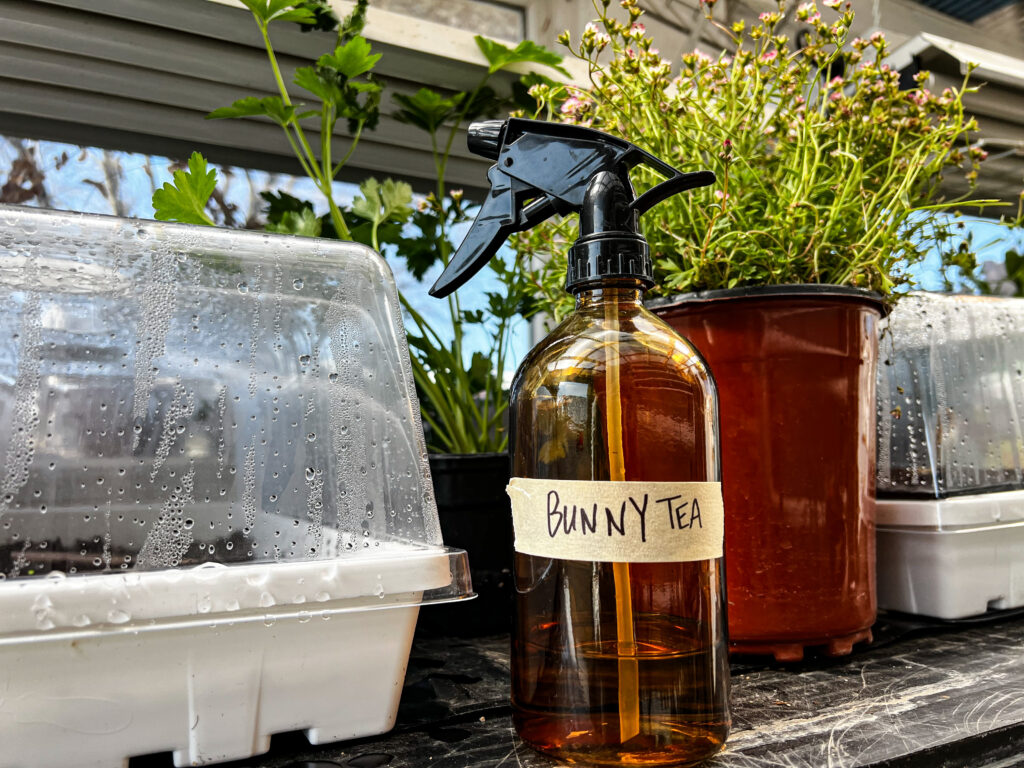
Why You’ll Love Using Rabbit Compost Tea
- Because Rabbit manure is considered a cold fertilizer, you won’t have to worry about putting too much on your plants like you would with hot manure: ie. chicken manure.
- We love using it when we transplant plants, shrubs, trees and seedings. It gives every green thing the perfect natural boost!
- Make up a big batch and use it all season!
- You could even sell your rabbit compost tea! There are probably plenty of people who would buy your composted rabbit tea! On the flip side, if you don’t have any, go ahead and ask a local farmer or a friend who has a rabbit and you can bet they’ll be willing to help you!
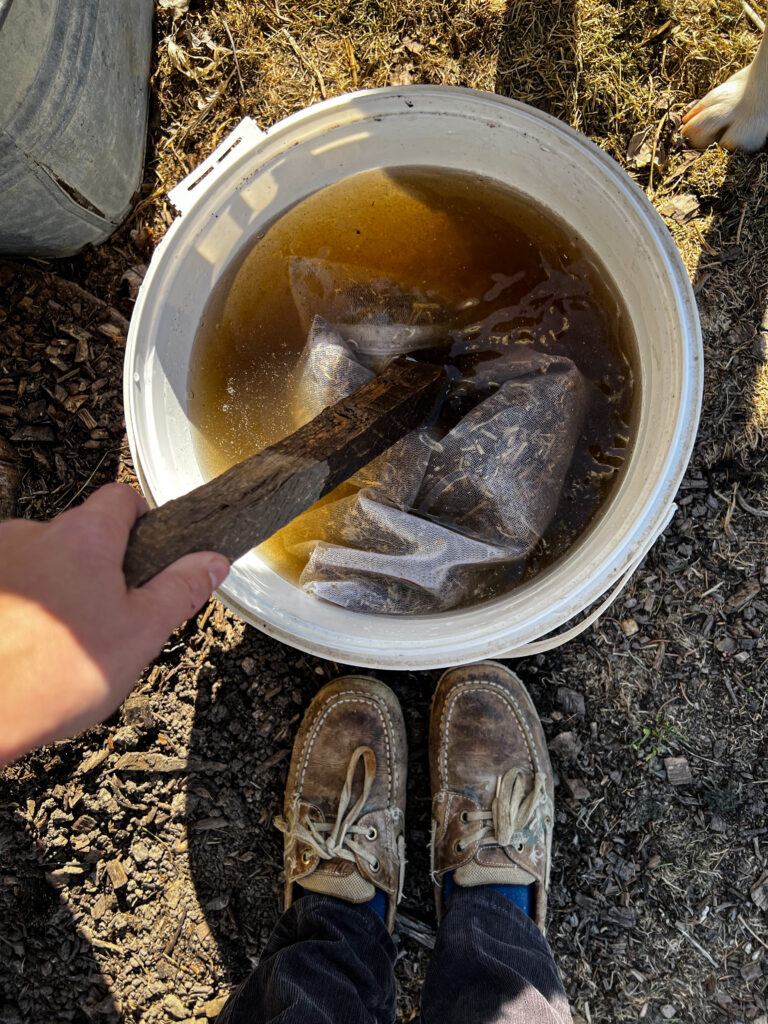
Ingredients / Materials you’ll need to Rabbit Compost Tea
- Water
- Rabbit Poo Pellets
- Mesh bag
- Spray Bottle
- Masking tape/ Sharpie or another way to label
How to Make Rabbit Compost Tea
I have always worked with a 5 gallons of water to 1 gallon of rabbit manure. We happen to have this much manure stored up by the end of the winter, but you could totally reduce this measurement if you don’t have 1 gallon of manure. Simply put, adding rabbit poop to water will make you some amazing compost tea, all ready to water your plants, flowers and vegetables with!
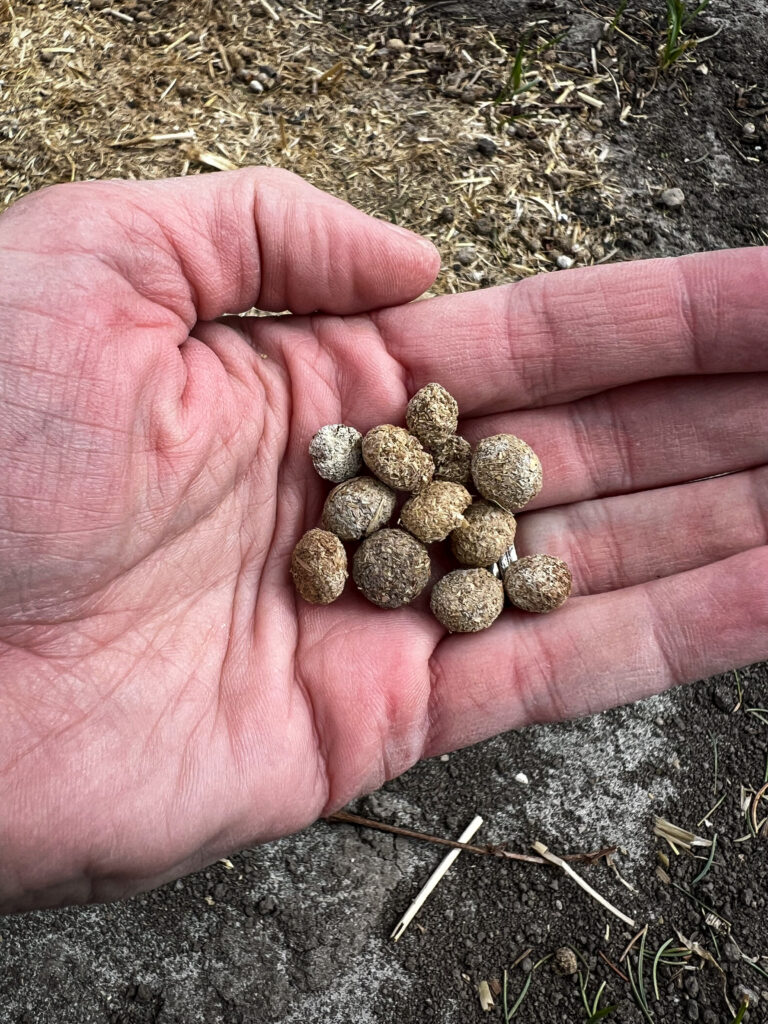
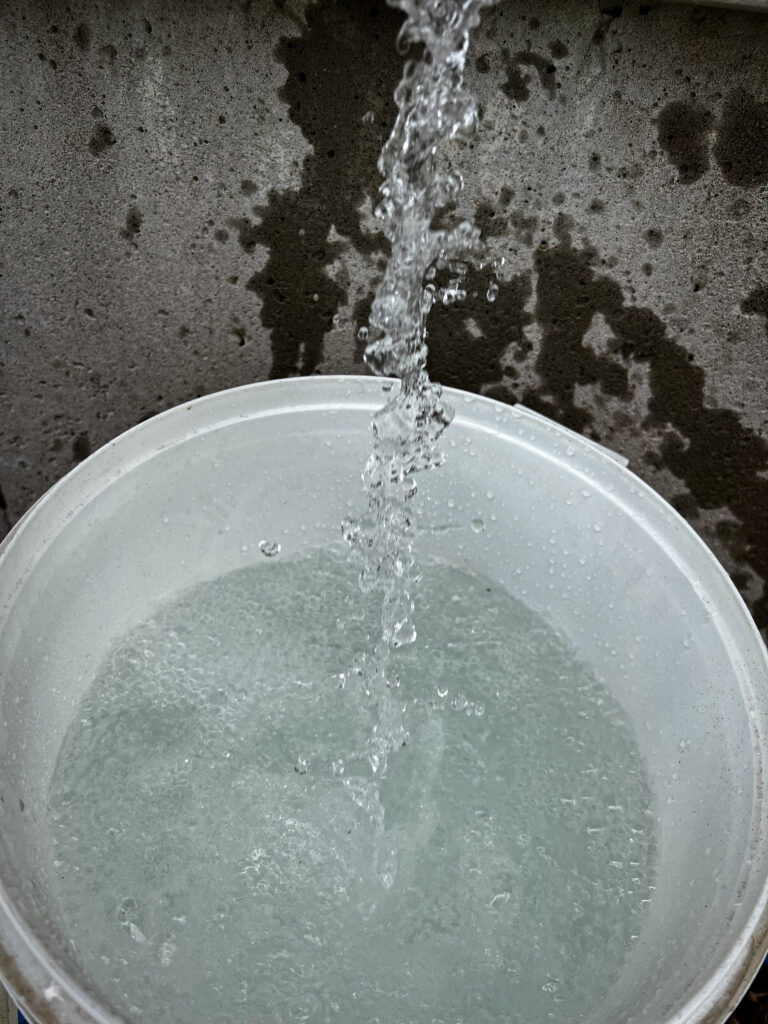
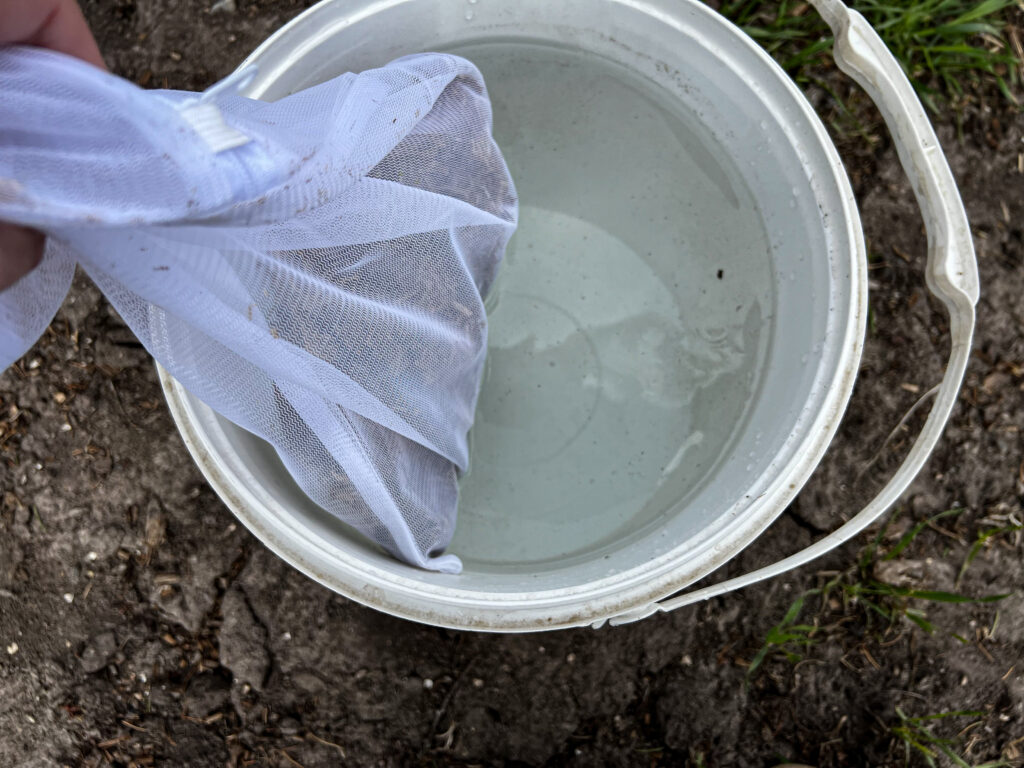
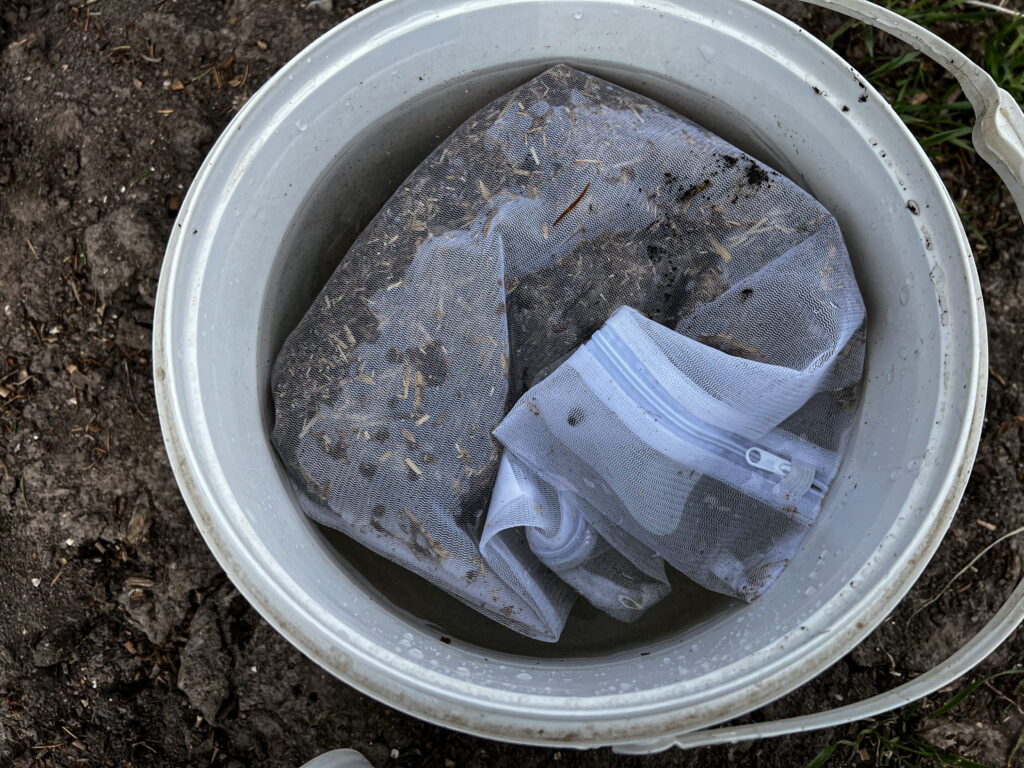
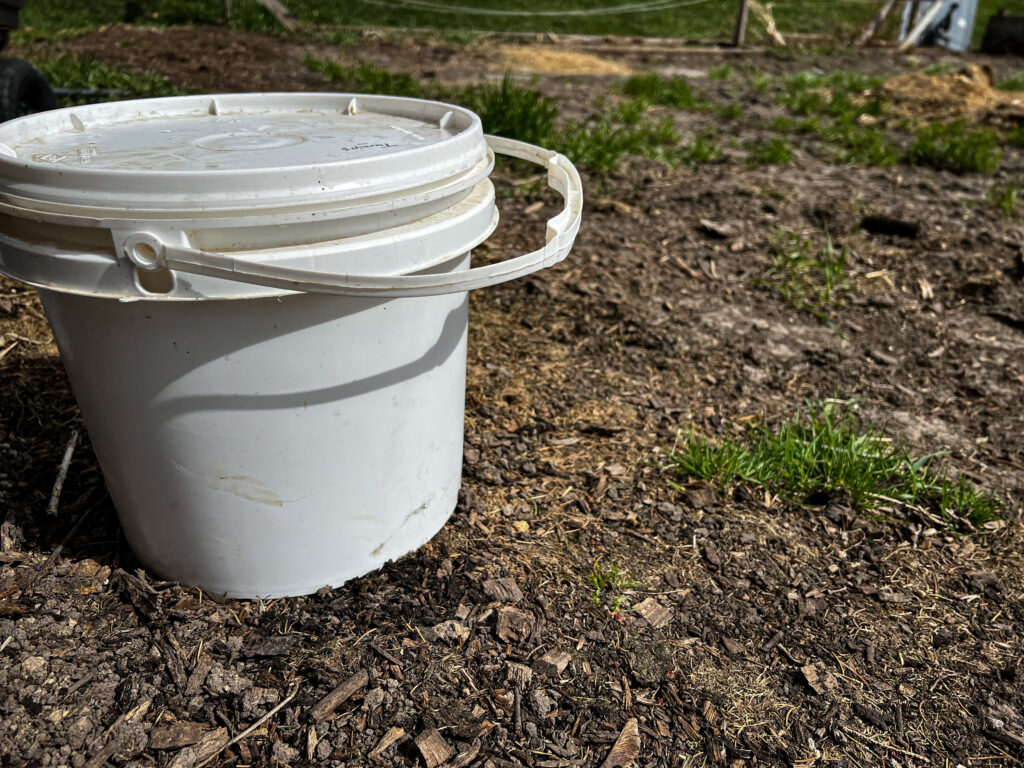

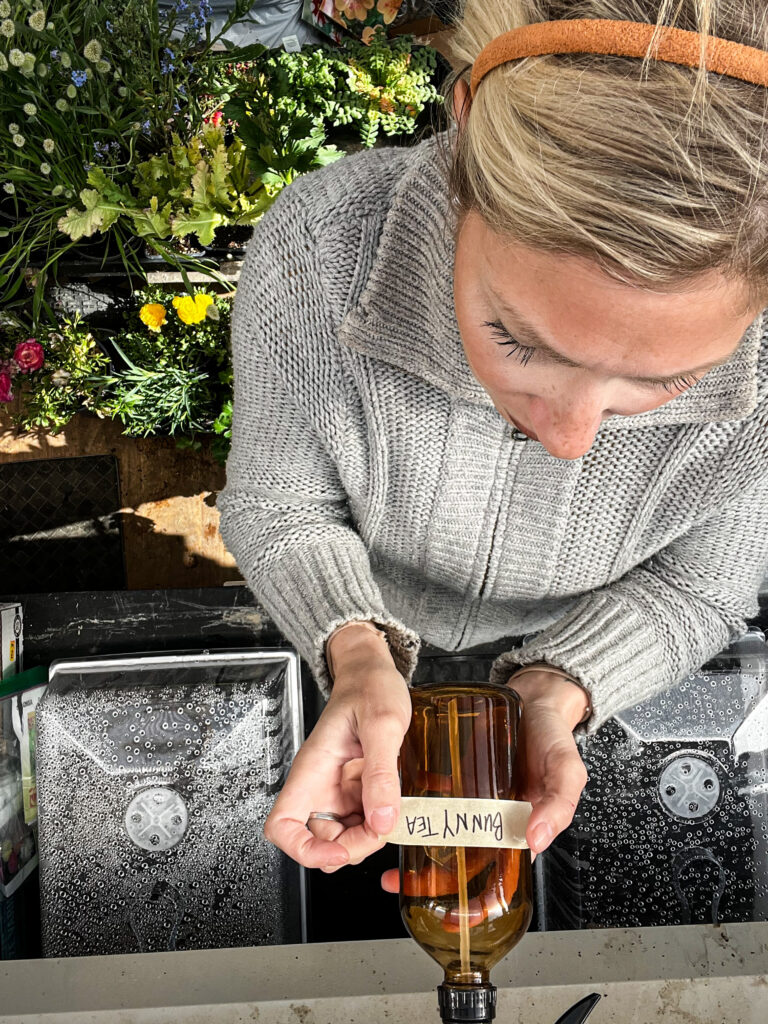

Steps to Making Rabbit Compost Tea
- Find yourself some rabbit manure. Rabbit manure is hard and dry making it easy to handle!
- Find a porous cloth, bag or piece of burlap (I use a simple garment bag used for delicates from the dollar store) to add your rabbit pellets to. We’re making a large tea bag.
- Add your rabbit poo to your porous bag.
- Fill an old 5 gallon bucket with a cover with water and add your tea bag of rabbit manure to it. It’s best to keep it warm and covered while it’s steeping.
- Keep your bucket of rabbit tea outside in a sunny, warm area to brew, stirring daily.
- After about 1 week, remove the bag from the water, and you’ve just made yourself a very high nutrient flower food! The manure dissolves over this time but if there are any rabbit droppings that didn’t fully disintegrate, you can just throw them in your garden
- To apply your rabbit tea, simply add it to a spray bottle or add to a watering can. This won’t burn your plants with this natural fertilizer as long as you use it in moderation!
Rabbit Compost Tea
Equipment
- Porous cloth, bag, or piece of burlap
Ingredients
- 1 gallon rabbit manure
- 5 gallons water
Instructions
- Find yourself some rabbit manure. Rabbit manure is hard and dry making it easy to handle!
- Find a porous cloth, bag, or piece of burlap (I use a simple garment bag used for delicates from the dollar store) to add your rabbit pellets to. We're making a large tea bag.
- Add your rabbit poo to your porous bag.
- Fill an old 5 gallon bucket with a cover with water and add your tea bag of rabbit manure to it. It's best to keep it warm and covered while it's steeping.
- Keep your bucket of rabbit tea outside in a sunny, warm area to brew, stirring daily.
- After about 1 week, remove the bag from the water, and you've just made yourself a very high nutrient flower food!
- You can compost the remaining rabbit manure or sprinkle it in your garden.
- To apply your rabbit tea, simply add it to a spray bottle or add to a watering can. This won't burn your plants with this natural fertilizer as long as you use it in moderation!
Notes
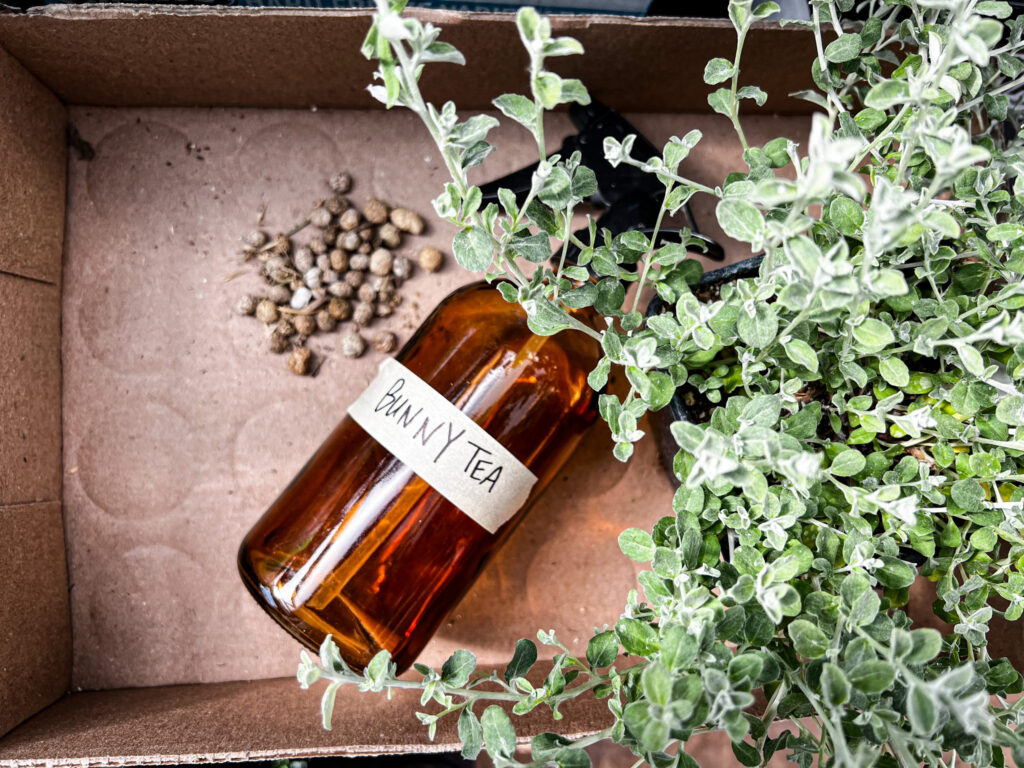
Tips about Making Composted Rabbit Tea
- Once the week is up, be sure to strain out the rabbit manure as well as anything else that might have gotten in the buck. Straining the tea down to liquid will help your spray bottle from getting clogged.
- Label! I make sure to use the same bucket, the same ‘tea bag’ and the same spray bottle for our bunny tea. Labeling this equipment will help you remember what is straight water and what is soley used for making your Rabbit Compost Tea.
- Keep your bunny tea bucket outside and in the sun if possible. In the warmer months it will take less time to get to that nice dark color. This means it’s ready to use.
- Toss the remaining ‘tea bag’ of bunny poop straight into your garden, raised bed or flower beds for a beautiful compost!
- This excellent fertilizer is super easy to spray on hydroponic planting systems. You can keep up with our hydro planting on our Instagram: @hearty.sol or Facebook: @Hearty Sol
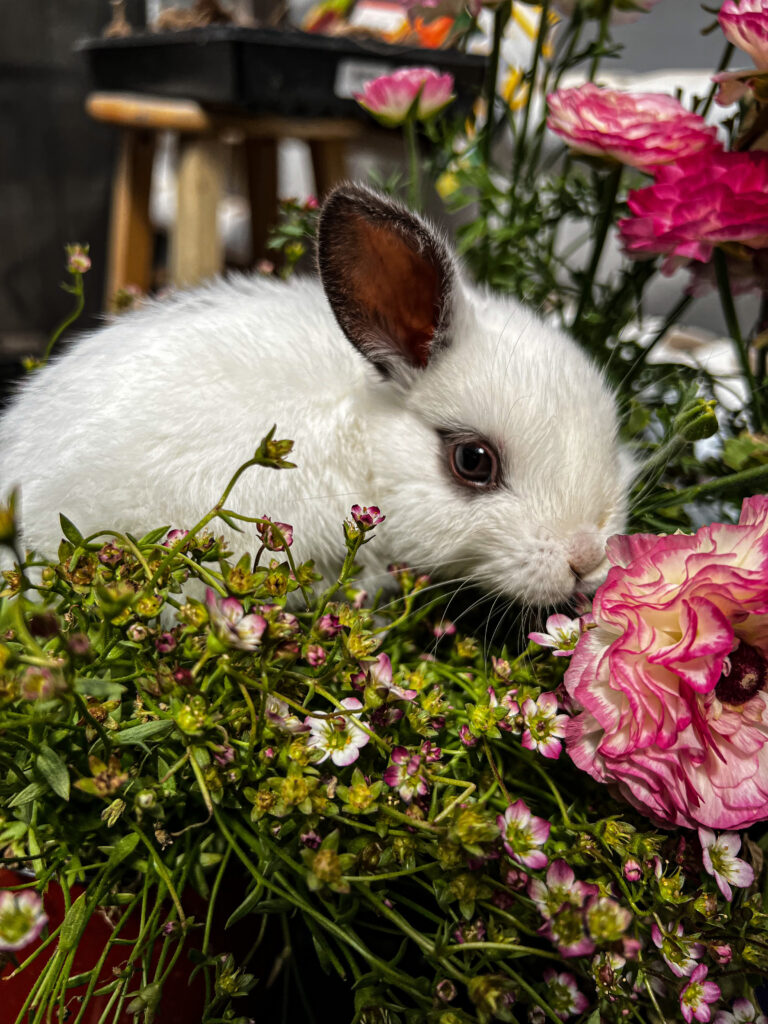
Questions People are asking about this Organic Fertilizer
Rabbit poop and rabbit poop fertilizer is jam packed with nutrients your plants need. You normally don’t have to worry about this burning your plants – just think everything in moderation, like how you wouldn’t want to overwater your house plant. Too much nitrogen can cause plant overgrowth and attract insects you don’t want! A high concentration of nitrogen, phosphorus, or potassium can have adverse effects to plant growth so to keep this in check, make it a habit to spray your garden weekly.
That’s right, rabbit’s pee can help your garden just like their poop does! Their urine contains the same trifecta of nitrogen, phosphorus, and potassium that their droppings do. Their urine can also be used as a natural fertilizer and has been known to keep unwanted pests away from your garden. Read more in our other bunny blog: Why we keep a Backyard Rabbit
Is compost tea better than compost? This rabbit poop tea is less time consuming and not as physically strenuous as hauling a compost pile around your garden. There also aren’t as many “ingredients” like coffee grounds, leftover food, grass clippings, wood chips / wood shavings etc. Overall, I deem the compost tea as the more efficient option.
Pin this for later!
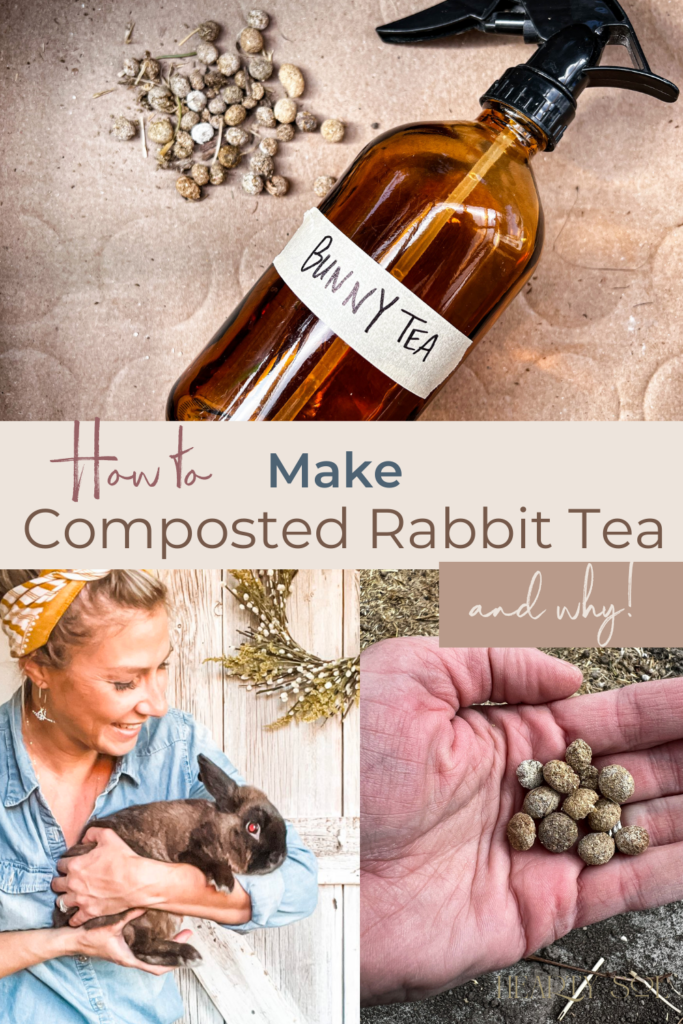
Check out our other Gardening Related Posts

Affiliate Disclosure & Content Disclaimer
This post may contain affiliate links from a paid sponsor, Amazon or other program. When you use these links to make a purchase I earn a small commission at no extra cost to you. This allows me to continue creating the content that you love. The content in this article is created for information only and based on my research and/or opinion.
Emily T.
DAILY INSPIRATION ON THE GRAM @hearty.sol
it's hip to be square!
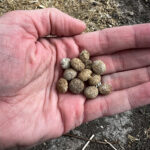
View comments
+ Leave a comment